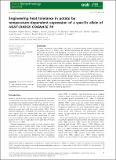Files in this item
Engineering heat tolerance in potato by temperature-dependent expression of a specific allele of HEAT SHOCK COGNATE 70
Item metadata
| dc.contributor.author | Trapero-Mozos, Almudena | |
| dc.contributor.author | Morris, Wayne L. | |
| dc.contributor.author | Ducreux, Laurence J. M. | |
| dc.contributor.author | McLean, Karen | |
| dc.contributor.author | Stephens, Jennifer | |
| dc.contributor.author | Torrance, Lesley | |
| dc.contributor.author | Bryan, Glenn J. | |
| dc.contributor.author | Hancock, Robert D. | |
| dc.contributor.author | Taylor, Mark A. | |
| dc.date.accessioned | 2017-06-20T16:30:08Z | |
| dc.date.available | 2017-06-20T16:30:08Z | |
| dc.date.issued | 2018-01-25 | |
| dc.identifier | 249089049 | |
| dc.identifier | 64faa52f-45d0-4dd5-b402-f496485b3b9f | |
| dc.identifier | 28509353 | |
| dc.identifier | 85021262375 | |
| dc.identifier | 28509353 | |
| dc.identifier | 000423363300018 | |
| dc.identifier.citation | Trapero-Mozos , A , Morris , W L , Ducreux , L J M , McLean , K , Stephens , J , Torrance , L , Bryan , G J , Hancock , R D & Taylor , M A 2018 , ' Engineering heat tolerance in potato by temperature-dependent expression of a specific allele of HEAT SHOCK COGNATE 70 ' , Plant Biotechnology Journal , vol. 16 , no. 1 , pp. 197-207 . https://doi.org/10.1111/pbi.12760 | en |
| dc.identifier.issn | 1467-7644 | |
| dc.identifier.uri | https://hdl.handle.net/10023/11035 | |
| dc.description | This work was funded by the BBSRC grant (BB/M004899/1) as part of the ERA-CAPS project HotSol and the Scottish Government Rural and Environment Science and Analytical Services Division as part of the Strategic Research Programme 2016-2021 | en |
| dc.description.abstract | For many commercial potato cultivars, tuber yield is optimal at average daytime temperatures in the range of 14–22 °C. Further rises in ambient temperature can reduce or completely inhibit potato tuber production, with damaging consequences for both producer and consumer. The aim of this study was to use a genetic screen based on a model tuberization assay to identify quantitative trait loci (QTL) associated with enhanced tuber yield. A candidate gene encoding HSc70 was identified within one of the three QTL intervals associated with elevated yield in a Phureja–Tuberosum hybrid diploid potato population (06H1). A particular HSc70 allelic variant was linked to elevated yield in the 06H1 progeny. Expression of this allelic variant was much higher than other alleles, particularly on exposure to moderately elevated temperature. Transient expression of this allele in Nicotiana benthamiana resulted in significantly enhanced tolerance to elevated temperature. An TA repeat element was present in the promoter of this allele, but not in other HSc70 alleles identified in the population. Expression of the HSc70 allelic variant under its native promoter in the potato cultivar Desiree resulted in enhanced HSc70 expression at elevated temperature. This was reflected in greater tolerance to heat stress as determined by improved yield under moderately elevated temperature in a model nodal cutting tuberization system and in plants grown from stem cuttings. Our results identify HSc70 expression level as a significant factor influencing yield stability under moderately elevated temperature and identify specific allelic variants of HSc70 for the induction of thermotolerance via conventional introgression or molecular breeding approaches. | |
| dc.format.extent | 386560 | |
| dc.language.iso | eng | |
| dc.relation.ispartof | Plant Biotechnology Journal | en |
| dc.subject | HEAT SHOCK COGNATE 70 | en |
| dc.subject | Heat tolerance | en |
| dc.subject | Potato | en |
| dc.subject | Promoter | en |
| dc.subject | Quantitative trait locus | en |
| dc.subject | Yield | en |
| dc.subject | QH301 Biology | en |
| dc.subject | NDAS | en |
| dc.subject | BDC | en |
| dc.subject | R2C | en |
| dc.subject.lcc | QH301 | en |
| dc.title | Engineering heat tolerance in potato by temperature-dependent expression of a specific allele of HEAT SHOCK COGNATE 70 | en |
| dc.type | Journal article | en |
| dc.contributor.sponsor | BBSRC | en |
| dc.contributor.institution | University of St Andrews. School of Biology | en |
| dc.contributor.institution | University of St Andrews. Biomedical Sciences Research Complex | en |
| dc.identifier.doi | https://doi.org/10.1111/pbi.12760 | |
| dc.description.status | Peer reviewed | en |
| dc.date.embargoedUntil | 2017-06-20 | |
| dc.identifier.grantnumber | en |
This item appears in the following Collection(s)
Items in the St Andrews Research Repository are protected by copyright, with all rights reserved, unless otherwise indicated.

